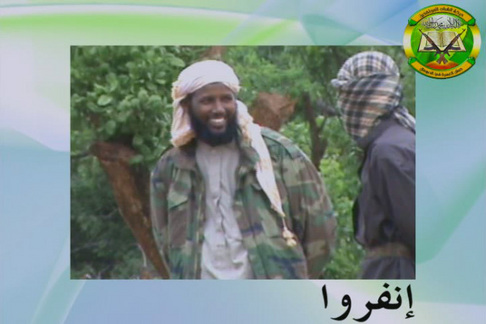The United States applied financial and travel sanctions on three top leaders of Al Shabaab, the Islamist insurgency that is consolidating territory in south and central Somalia, as the process of the group’s official integration with al Qaeda appears to be underway. The sanctions target Shabaab founder and emir Ahmed Abdi Aw Mohamed, recruiter Issa Osman Issa, and spokesman and military commander Sheikh Abu Mukhtar Robow.
Ahmed Abdi Aw Mohamed, emir of the Harakah Al-Shabaab Mujahidin (Youth Mujahideen Movement/Army of Difficulty), founded the group in 2006 as the militant youth wing of the Islamic Courts Union (ICU). A native of Somaliland from the Ishaak clan, he is 31 years old and is also known as Sheikh Mukhtar Abu Zubayr and Godane, the nickname of his grandfather. He has taken on a more visible role since the death of Shabaab’s chief military commander Aden Hashi Ayro in a May 1, 2008, airstrike. In April 2008, Ethiopian forces announced Mohamed’s death during a shoot out at a roadblock near Jowhar, however, this was proven false.
Issa Osman Issa, an ethnic Somali born in Malindi, Kenya, was a member of al Qaeda’s East Africa cell that was responsible for the simultaneous attacks on the U.S. embassies in Nairobi and Dar es Salam in 1998. He served as an al Qaeda recruiter and was a central player in the simultaneous attacks on the Paradise Hotel in Kikambala, which killed 15 people and injured 40, and the attempted surface-to-air missile attack on an Israeli passenger jet in Mombasa. He and Mombasa cell leader Saleh Ali Saleh Nabhan are alleged to have personally fired the two Strela 2 missiles. Nabhan, according to reports, facilitated communications with Osama bin Laden for the cell, and is the current chief military strategist for Shabaab. Issa was reportedly killed on March 10, 2006, during a counterterrorism raid, however, the accuracy of the report is unknown.
Sheikh Abu Mukhtar Robow, also known as Abu Mansur, is the most visible member of Shabaab and serves both as a military commander as well as the group’s spokesman. He frequently appears in Arabic and Somali-language propaganda videos posted on the Internet, often visiting training camps alongside Saleh Ali Saleh Nabhan. Robow is believed to be in his 40s and hails from the Rahanwein clan native to Baidoa in central Somalia. In the 1990s he worked in Mogadishu for the Al Haramein Saudi foundation, which served as a conduit for al Qaeda, and later trained and fought with al Qaeda and the Taliban in Afghanistan. Robow frequently connects with hardcore supporters in the Somali Diaspora through weekly Paltalk forums. In September 2008 he told a forum that the establishment of the “Islamic Emirate of Somalia” would be “imminent.”
The sanctions come at a critical juncture for Shabaab as it consolidates south and central Somalia under its control. Although the establishment of the emirate has not yet been formally announced, its formation is appearing in the form of Sharia-based administration and legislative councils in Kismayo and other major cities.
Public lashings are now commonplace and earlier this month a 13-year old rape victim was stoned to death as punishment for adultery. Shabaab forces overran Merka, a strategic port 90 km south of Mogadishu, on Nov. 12 and are reportedly amassing fighters and moving freely 18 km from the capital city.
Nabhan, who knows Osama bin Laden personally and speaks fluent Arabic, formally reached out to al Qaeda senior leaders in a video posted on the Internet on September 2. He declared an oath of bayat (loyalty) on behalf of Shabaab to bin Laden and al Qaeda and encouraged fighters to train in Shabaab-run camps and participate in the fight against the transitional federal government, Ethiopian forces and African Union peacekeepers.
The response to Shabaab’s declaration came on Nov. 19 when al Qaeda operations chief Ayman al-Zawahiri acknowledged the group in a propaganda video by calling them “my brothers, the lions of Islam in Somalia.”
“(R)ejoice in victory and conquest,” Zawahiri said in an official transcript acquired by The Long War Journal, “and hold tightly to the truth for which you have given your lives, and don’t put down your weapons before the Mujahid state of Islam and Tawheed has been set up in Somalia.”
The messaging exchange mirrors the process followed in 2006 by Algeria’s Salafist Group for Preaching and Combat (GSPC) to request integration into al Qaeda.
Although the United States is not overtly involved in the crisis, an Iranian press report claims US intelligence officials have met with members of the Puntland de facto administration in Bossasso. Although the report does not detail the reasons for the visit, the presence of and Puntland and Somaliland’s close cooperation with American and European intelligence has long been known within Somalia and the Somali Diaspora.









3 Comments
Well, it was only a matter of time. There is no way US troops should be sent there in force. You target thier leaders, you hit the places they congregate. We have too much on our plates now. This has gotten away from us, it has mushroomed into a multi-headed monster. Carpet bombing may be an option here….I cannot believe I feel that, but Iam frustrated.
i dont get it, cause if Abu Mukhtar Robow is the most visible we should have been took him out, i mean this guy do press conferences and al-shabab is not that potent its just ethiopia dont have a strategy,i hope the meetings in puntland take effect cause i would like to see more strikes on their leadership since they close to taking the country
It doesn’t matter if their leadrs die or not they have an ideolgy that keeps them moving. The problem is how does one kill an ideolgy?